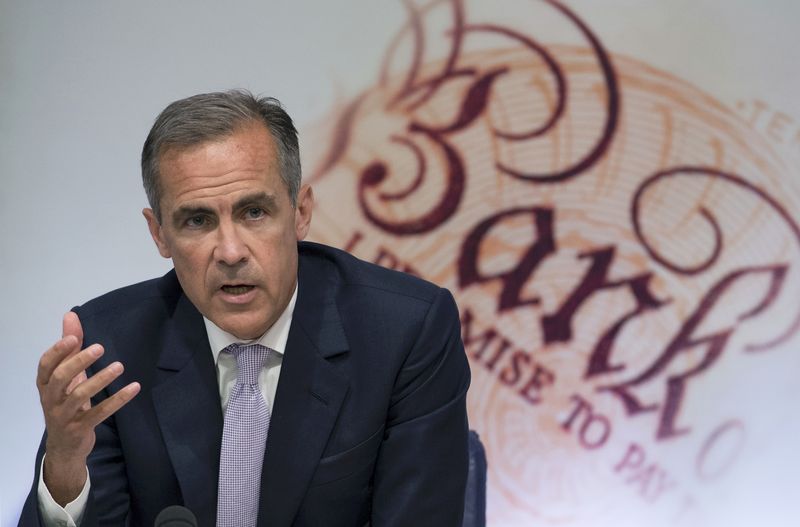 © Reuters. Carney affirms that interest rate hikes will arrive sooner and to greater extent; watching Brexit
© Reuters. Carney affirms that interest rate hikes will arrive sooner and to greater extent; watching Brexit Investing.com – Following the Bank of England’s on Thursday to , governor noted that the its plans for the removal of policy accommodation is now likely to come sooner and to a greater extent than previously thought.
“With the world economy strengthening and UK growth just above our economy’s speed limit, we expect to reduce some of the support we are providing in order to bring inflation back to its 2% target,” Carney explained.
Rate hikes likely to be sooner, but not more rapidly
However, the BoE governor did insist that interest rates were likely to remain “substantially lower” than a decade ago.
As part of his speech, Carney cited the in repeating that “the Committee judges that, were the economy to evolve broadly in line with the February Inflation Report projections, monetary policy would need to be tightened somewhat earlier and by a somewhat greater extent over the forecast period than anticipated at the time of the November Report, in order to return inflation sustainably to the target.”
When questioned by journalists about the specific details of future rate hikes, Carney emphasized that tightening would “not (be) more rapidly, but somewhat sooner and to a somewhat greater extent”.
He further tried to explain that he didn’t see rates returning to pre-crisis levels. “We’re not talking about going back to those levels. And we’re not talking about going at that pace,” he specified in a reference to the outlook that tightening would occur at a “gradual pace and to a limited extent”.
At several points of the question-and-answer period, Carney repeated that he won’t be “tied down” on the specific details of future rate hikes as it will depend on economic developments.
In particular, Carney sidestepped a direct answer as to the question that market commentaries after Thursday’s decision were pointing to a higher probability of a rate hike in May, insisting on the fact that policy would be determined by the data.
“Crucial year for Brexit Negotiations”
He further commented that it was a “crucial year” for Brexit negotiations. In summary, he admitted that the overall impact remained to be seen and could be positive, negative or neutral.
Carney later pointed out that if there was no Brexit transition deal by March, the impact on monetary policy would depend on how household and business confidence are affected.
He also highlighted that, based on order of magnitude, the most important decisions that will affect UK households would be the Brexit outcome and not interest rates.
The BoE chief did clarify that their current forecasts were based on two specific Brexit factors which assumed a “smooth transition” and that it would lead to an “average of potential outcomes”.
Of note, in the latest released on Thursday, the British central bank said that it expects inflation to drop to 2.28% in one year’s time, 2.16% in an additional year and then to 2.11% on the three-year horizon.
The BoE also lifted their forecast for growth in 2018 to 1.8%, from the previous 1.6%, and to a repeat of a 1.8% expansion in 2019 compared to the prior projection of 1.7%.
Carney mostly concluded the subject of Brexit by stating he was confident that the BoE will be a lot better informed on Brexit prospects by the end of the year and will be able to adjust policy appropriately if there is greater uncertainty.
Source: Investing.com

























